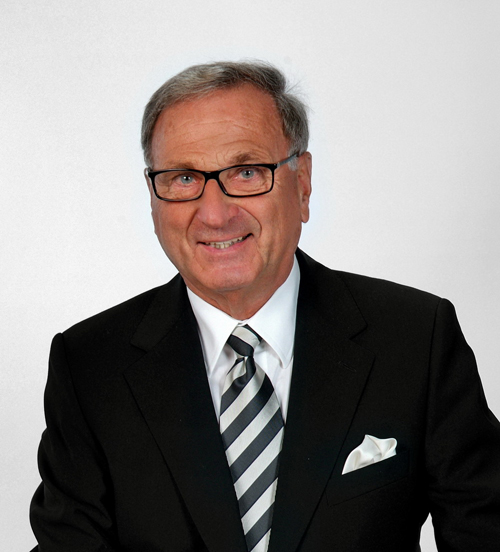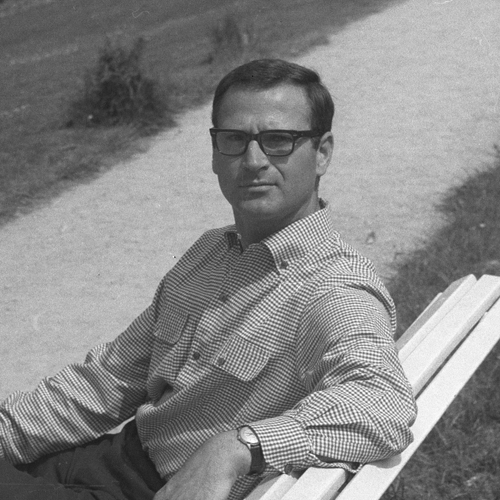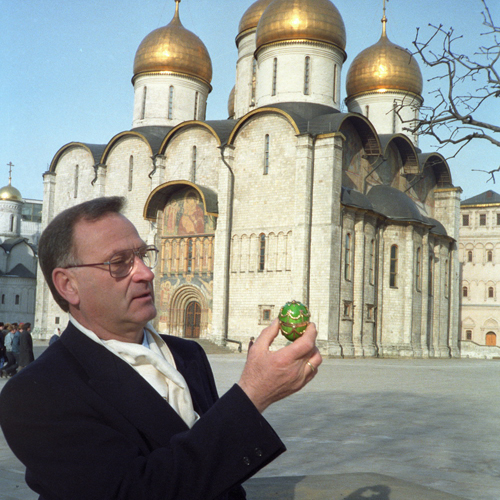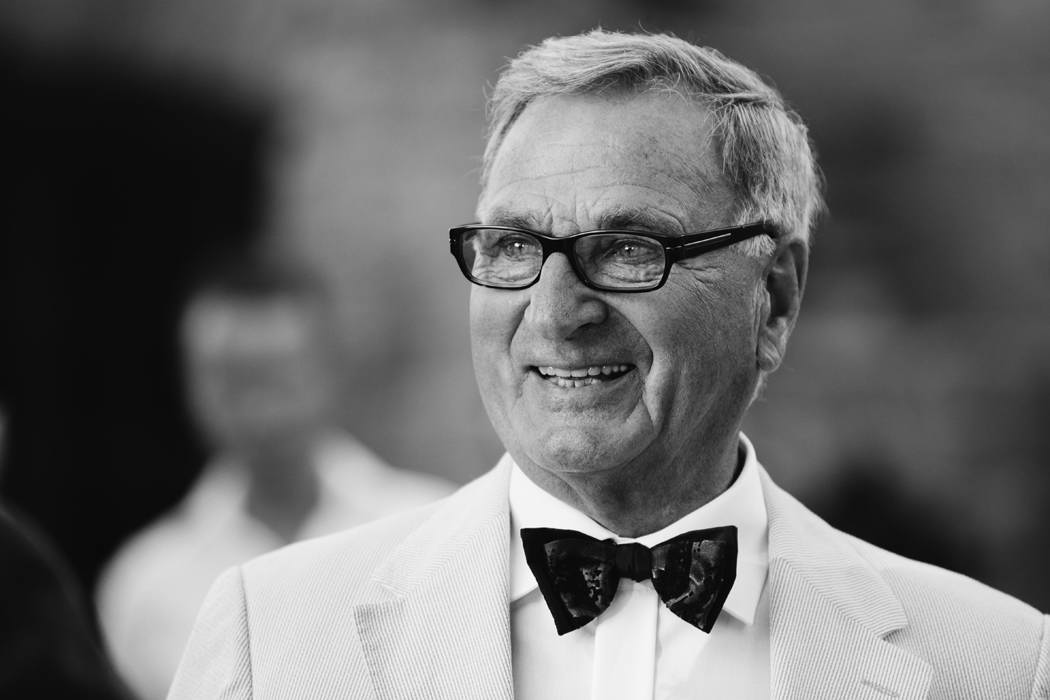DE | EN
Biography of Dr. Herbert Mohr-Mayer
 The entrepreneur Dr. Herbert Mohr-Mayer was born September 22, 1933 in Pforzheim, the son of jewellery manufacturer Edmund Mohr and his wife Maria, née Mayer. From 1965 to 2003 he was proprietor and CEO of the jewellery manufacture VICTOR MAYER, Pforzheim.
The entrepreneur Dr. Herbert Mohr-Mayer was born September 22, 1933 in Pforzheim, the son of jewellery manufacturer Edmund Mohr and his wife Maria, née Mayer. From 1965 to 2003 he was proprietor and CEO of the jewellery manufacture VICTOR MAYER, Pforzheim.
At the age of 11, he experienced one of the most severe air bombardments of the second world war, sheltering in the cellar of his home. On February 23, 1945 the city of Pforzheim was destroyed in the space of just 20 minutes. The level of destruction was unsurpassed amongst German cities. Experiencing the horror of war first-hand not only meant staring death in the face and thankfully surviving. It also meant witnessing the unimaginable, senseless suffering of thousands of badly injured people and the deaths of 20,000, perhaps even as many as 25,000. Almost the entire city was consumed by the flames. Worse than the destruction of his school was the death of two thirds of his classmates. This childhood memory was decisive in forming Mohr-Mayer’s tolerant and pacifist outlook.
After acquiring his school-leaving qualifications Mohr-Mayer went on to study Economics at the universities of Mainz, Bonn and Munich. He completed his studies at Friedrich-Alexander-Universität Erlangen in 1958 as a graduate economist, going on to complete a doctorate in Economics there in 1960 under Prof. Stucken, receiving the title of Dr. rer. pol. His horizons were further broadened by studies in Cambridge and – highly unusual for the Cold War era – at Lomonosov Moscow State University.
 The young Dr. Mohr-Mayer began his professional career in Düsseldorf as a management assistant in the steel industry. In the Rhineland metropolis, which was also a centre for fashion and the arts, he was able to indulge his diverse interests, also meeting his future wife, Heidrun Steffen.
The young Dr. Mohr-Mayer began his professional career in Düsseldorf as a management assistant in the steel industry. In the Rhineland metropolis, which was also a centre for fashion and the arts, he was able to indulge his diverse interests, also meeting his future wife, Heidrun Steffen. In 1965 he took over the jewellery manufacture founded by his grandfather, becoming the third generation of the family to lead the enterprise. This was wholly unplanned. When his father, Edmund, approached him with the offer of running the family company, he realized that he preferred the challenge of being an entrepreneur in a medium-sized company to a future as a manager in a corporate group. The transition from “steel to gold” was eased in 1964 by internships at the renowned jewellers Asprey in London and Altenloh in Brussels.
In 1965 the young entrepreneur married Heidrun Steffen. The marriage to the Danzig-born Düsseldorf resident produced three sons: Dr. Marcus Oliver (1967), Dr. Daniel Alexander (1968) and Dipl.-Ing. Christoph Philipp (1972).
Together with his cousin Hubert Mayer, Mohr-Mayer transformed VICTOR MAYER into an internationally active company, purchasing all shares in the company following his early death and adding the name of his grandfather Victor “MAYER” to his surname as well as acquiring the license for the FABERGÉ brand in 1989. Despite his extensive travels - Mohr-Mayer exhibited at 19 fairs worldwide each year, travelling to the USA, Africa, Russia, Middle and Far East as well as throughout Europe - he still found time for voluntary commitments: Mohr-Mayer sat on the board and advisory board of both the Jewellery Association and the Association of Creditors. He was a member of the vocational training committee of the Chamber of Commerce and Industry Northern Black Forest and was an examiner for the commercial examinations of the chamber at the Fritz-Erler-Schule in Pforzheim over a two-decade period.
 In spite of his heavy workload, Mohr-Mayer always found time for his musical interests. As an adolescent, Mohr-Mayer began playing as a violinist in various orchestras and a jazz quartet, continuing to play music well into old age on numerous private and work occasions. He was an active member of the board of the Pforzheim Association of Arts and Crafts for several years. As a knight of the Schlaraffia Porta Herzyniae, he became familiar with the symbiosis of art and humour in this unconventional association. He delivered legendary performances as Bishop St. Nicholas at Christmas parties for chambers and associations, demonstrating his talent for satire.
In spite of his heavy workload, Mohr-Mayer always found time for his musical interests. As an adolescent, Mohr-Mayer began playing as a violinist in various orchestras and a jazz quartet, continuing to play music well into old age on numerous private and work occasions. He was an active member of the board of the Pforzheim Association of Arts and Crafts for several years. As a knight of the Schlaraffia Porta Herzyniae, he became familiar with the symbiosis of art and humour in this unconventional association. He delivered legendary performances as Bishop St. Nicholas at Christmas parties for chambers and associations, demonstrating his talent for satire.Throughout his life, Mohr-Mayer suffered from a form of “founding fever”. As a student, he established the Academic Riding Club in Erlangen. Together with his childhood friend Hermann Schütz, he founded the Juwel and later the DELAN Group - associations of German jewellery manufacturers aimed at promoting exports to the Far East, and Japan in particular. He was a member and, from 1973, chairman of the Wirtschaftsjunioren business association, going on in 1975 to found its successor organisation, the Seniorenkreis grouping of the Chamber of Commerce and Industry Northern Black Forest, of which he was twice chairman.
In 1995 Mohr-Mayer established the Stiftung Else Mayer foundation, named after his aunt. Based in Bonn, this socially active body evokes the works of Else Mayer (1891-1963), who established the Catholic emancipation organisation Congregatio Salvatori Mundi in 1916. The sisters of the order pursued the goal of promoting and supporting girls and women of all social backgrounds. In the years 2006-2018 the Else Mayer-Stiftung made a name for itself with the awarding of the Else Mayer Prize, presented a total of 33 times from 2006 by Mohr-Mayer in person, including to the former education minister Annette Schavan, the theologian Dr. Andrea Qualbrink and virtuoso violinist Anne-Sophie Mutter.
The greatest challenge in the life of Herbert Mohr-Mayer was the revitalisation of the FABERGÉ jewellery label from 1990. The VICTOR MAYER manufacture that he headed was practically predestined to continue the life work of Carl Fabergé. By the end of the 1970s Mohr-Mayer had already begun investing in the preservation and nurturing of old trades and crafts. For example, his company made a name for itself as an outstanding specialist for skills such as enamel or guilloché work. 1990 saw the presentation of the first collection under the artistic direction of Mohr-Mayer and in the shortest of times FABERGÉ had re-established itself as one of the leading international brands of the jewellery world. This task required great sensitivity from Mohr-Mayer regarding design philosophy, knowledge of art history and technical expertise. In 1992 Mohr-Mayer was awarded the title of “Maître de Fabergé”. FABERGÉ pieces from this creative period are to be found in numerous museums around the world, such as in Moscow, Bonn, Gdansk, Vilnius, Malta, Berlin and New Orleans. FABERGÉ jewels decorate the cabinets of kings and heads of state. Herbert Mohr-Mayer was particularly honoured by the inclusion of one of his FABERGÉ creations in the Haus der Geschichte museum in Bonn by President Richard von Weizsäcker, a permanent presentation in the German Museum of Technology, Berlin, demonstrating the manufacture of a FABERGÉ egg, the permanent exhibition of 7 golden FABERGÉ eggs in the historical department of the Schmuckmuseum Pforzheim (Pforzheim Jewellery Museum) Schmuckmuseums and inclusion in the UNESCO list of intangible cultural heritage in 2015 for the efforts to preserve endangered goldsmithing professions with the “Manufactory Jewellery Design” working group.
The FABERGÉ works of VICTOR MAYER have been publicised extensively in films and trade literature. Mohr-Mayer himself delivered lectures internationally on FABERGÉ and the renaissance of hand craftsmanship, for example at the Technische Universität Berlin.

Mohr-Mayer received numerous distinctions for his life’s work and commitment, including the Wirtschaftsmedaille of the State of Baden-Württemberg. He was awarded the Goldene Sportabzeichen seven times – mens sana in corpore sano.
In 2003 the entrepreneur withdrew from an active position at the company, handing leadership of the manufacture to his son Dr. Marcus Oliver Mohr.
Dr. Herbert Mohr-Mayer has lived in Baden-Baden since 1998, he writes books, makes music, paints, travels, studies and dedicates himself to the finer things in life that he had insufficient time for in his long professional career.
Publications by and on the subject of Dr. Herbert Mohr-Mayer:
Herbert Mohr-Mayer, Von Goldenen Eiern und anderen Pretiosen, verlag regionalkultur, ISBN-10 : 3897356201, ISBN-13 : 978-3897356207
Herbert Mohr-Mayer, Victor Mayer (1857-1946), 'Humorous, Diligent and Socially Conscientious.', verlag regionalkultur, ISBN-10 : 3897355272, ISBN-13 : ISBN-13 : 978-3897355279
Herbert Mohr-Mayer, Die Stiftung Else Mayer, Stiftung Else Mayer
Herbert Mohr-Mayer, Niemand war Schreiner, Eigenverlag
Géza von Habsburg, Fabergé: Then and Now, Hirmer, ISBN-10 : 3777426350, ISBN-13 : 978-3777426358
Anne Barbara Kern, Fabergé Eggs: by VICTOR MAYER, Arnoldsche, ISBN-10 : 3897904357, ISBN-13 : 978-3897904354
Herbert Mohr-Mayer, Victor Mayer (1857-1946), 'Humorous, Diligent and Socially Conscientious.', verlag regionalkultur, ISBN-10 : 3897355272, ISBN-13 : ISBN-13 : 978-3897355279
Herbert Mohr-Mayer, Die Stiftung Else Mayer, Stiftung Else Mayer
Herbert Mohr-Mayer, Niemand war Schreiner, Eigenverlag
Géza von Habsburg, Fabergé: Then and Now, Hirmer, ISBN-10 : 3777426350, ISBN-13 : 978-3777426358
Anne Barbara Kern, Fabergé Eggs: by VICTOR MAYER, Arnoldsche, ISBN-10 : 3897904357, ISBN-13 : 978-3897904354